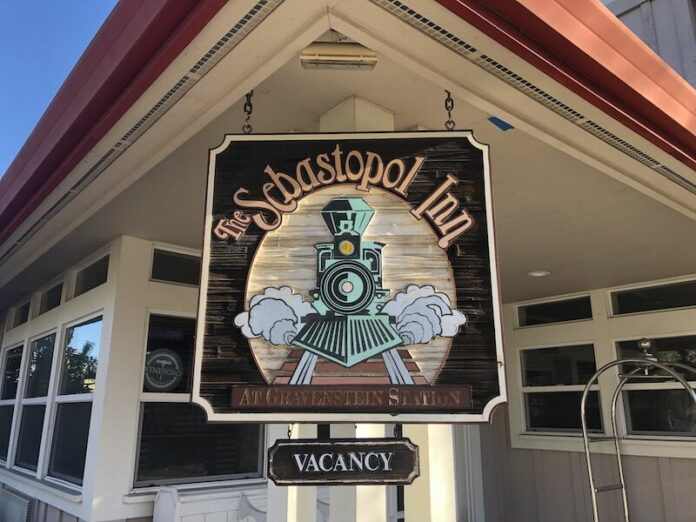Over the next two weeks, Sonoma West Times & News will be rehashing 2020 in west county. We’ll be reviewing the biggest events in the local schools, as well as covering topics such as COVID-19, health care, homelessness and more.
Before the coronavirus hijacked everyone’s plans, the Sonoma County Board of Supervisors flipped open 2020 with at least one lawsuit behind them and an intent to sort out its homelessness crisis gaining urgency with the Joe Rodota Trail encampment, the largest tent city in the county, scheduled for a sweep at the end of January.
That month, Sonoma West reported that housing officials said only 750 emergency beds or housing units were available for the county’s population of 2,800 homeless individuals.
There were homeowners along the Joe Rodota Trail and others who wanted the makeshift village cleared. 5th District Supervisor Lynda Hopkins swatted a recall campaign and the appearance of a rival candidate as she sought reelection March 3, both criticizing her approach to homelessness.
There were also townspeople who distributed clothing, food, blankets, tents and sleeping bags down the trail. The Sonoma County Acts of Kindness group on Facebook led some of these efforts, created by sisters Jillian and Rochelle Roberts in Sebastopol and their friend, Heather Jackson. When the county split up the camps Jan. 31, group members helped people pack to find or make shelter elsewhere.
One woman screamed and threatened suicide from her tent and police called for mental health backup, “but when the woman emerged and recognized Roberts, they sat and talked for two or three hours and then Roberts helped her pack up her things,” Sonoma West Times & News reported.
Sonoma West Times & News reported 40 members of Sonoma County Acts of Kindness joined 75 people largely from the Oakmont neighborhood to prepare dinner for people relocated to the Los Guilicos temporary outdoor shelter each night since the sweep.
She said, “We truly feel that we’re not contributing to the behavior or enabling it. We feel that we are building relationships to pull them out of that behavior.”
According to Sonoma West Times & News in February, around 15 individuals who used to live on the Joe Rodota Trail set up camp on West Robles Road in west county.
Rochelle Roberts said the Sonoma County Acts of Kindness joined up with Santa Rosa’s Democratic Socialists of America and Forestville’s Squeaky Wheel Bicycle Coalition to help establish this encampment on rural county property with tarps, buckets with toilet seats and PVC pipe, zip-tying garbage cans to the fence.
In March, Hopkins won reelection, having declared homelessness as her first priority in a second term.
In June, Sonoma West Times & News reported on the initial findings of an upcoming countywide grand jury report, which discovered 28% more homeless young people than in 2019, 3.5 times the national average.
Some factors the grand jury identified were a lack of emergency shelter beds in the county outside of Santa Rosa, a lack of youth-specific substance abuse and mental health programs and rehabs and unreliable funding for most homeless programs in general.
Among the grand jury’s recommendations said, “if it is safe to do so, Sonoma County Department of Health Services set aside a small number of beds for unaccompanied youth in the new short-term mental health facility in Sebastopol, by Dec. 31, 2020.”
Sonoma West Times & News found no further detail on a Sebastopol facility in its reporting at the time. Yet, that June, Gov. Newsom created the Project Homekey program to fund city and county efforts to purchase hotels, motels and vacant apartment buildings to develop into permanent housing for homeless Californians vulnerable to COVID-19.
The Sonoma County Civil Grand Jury released its full annual report at the end of July, which said 2019 data indicated two-thirds of the 3,000 residents without permanent housing slept in doorways, cars, RVS and encampments with under 1,000 temporary or emergency beds in the county.
However, Department of Health Services Director Barbie Robinson, also interim executive director of the county’s Community Development Commission, provided supervisors an initial report in July finding homelessness had decreased 7% since 2019, adjusting official numbers to 2,745.
The grand jury said despite the county’s roughly $12 million plans, conditions weren’t changing much without a countywide strategy. Meanwhile, one of the county’s new and sanctioned outdoor-indoor encampments popped up in Guerneville.
That August, the supervisors were eyeing Hotel Azura in Santa Rosa and the Sebastopol Inn in Sebastopol as Project Homekey sites and voted to send Measure O to voters in the Nov. 3 election, for a quarter of a cent sales tax for mental health and homelessness services.
Sonoma West Times & News reported in September that the board of supervisors allocated $2 million of the 2020-2021 county budget toward buying the Sebastopol Inn and Hotel Azura for permanent supportive housing under Project Homekey.
In November, Measure O passed, projected to bring in $25 million each year for a decade toward mental health, addiction and homelessness services and facilities. Transitional and supportive housing programs would receive 2% of the revenue.
Then Sonoma West Times & News reported the delayed release of the Feb. 28 Point-In-Time Homeless Census Comprehensive Report, discovering 40% of the 2,745 unsheltered individuals counted had been regularly homeless for years, while 31% were homeless for the first time. The count found 327 homeless people in west county, where Sebastopol was home for 129 unsheltered people.
That November, Sonoma County received $6.375 million in Project Homekey funding, rescuing the Sebastopol Inn from the state waitlist as the Dec. 30 deadline for counties to complete their purchases approached. The county proclaimed the total cost to convert the property into interim housing was $10.85 million in acquisition, development and operation costs.
Sonoma West Times & News reported Robinson said the Accessing Coordinated Care to Empower Self Sufficiency Initiative, or the ACCESS Initiative, would provide personalized services like primary healthcare, behavioral health care, economic and food aid and job training to new residents.
In December, Sebastopol’s newly-appointed Mayor Una Glass said some constituents misunderstood that the city cannot slow down the process because the Sebastopol Inn’s Project Homekey plan is a county project, out of the city’s control.
Although the future operator and service provider would be chosen by the county, Glass said the city could draft a letter recommending West County Community Services (WCCS), the organization behind the similar Park Village Housing Project near the Sebastopol Inn.
WCCS Executive Director Tim Miller said he would be interested in applying to operate the site during a Request for Proposal (RFP) process once the program would transition to permanent supportive housing after the pandemic crisis had passed.
At a Sebastopol City Council meeting Dec. 15, Robinson said the new neighbors would arrive at the Sebastopol Inn by the end of 2020. Those prioritized for housing were COVID-19 vulnerable community members, aged 65 and older, and/or who have chronic or serious health issues, like diabetes, COPD, cancer, and mental health and substance abuse issues. Most would transition from the county’s non-congregate sites.
Robinson said residents will receive breakfast, lunch and dinner on site, premises monitored by White Star Security. Disaster Emergency Medical Assistance (DEMA) will serve as the interim medical provider, offering also activities like gardening, art, movie nights and community volunteer work.
Robinson assured concerned community members that sex offenders were not eligible for residency and Michelle Patino, head of DEMA, said alcohol, drugs and weapons were prohibited on-site, where residents would be searched upon entering.
Amidst supportive feedback for the project, some locals from Sebastopol’s business sector opposed the project and its potential impact on the Gravenstein Station and the Barlow marketplaces.
In fact, Coffee Catz owner Debby Meagher said she’s trying to sell her shop after 28 years because of the combined pressures of running the cafe alone in the pandemic and the Sebastopol Inn potentially hurting her business. Her daughter, Keli Meagher, said the new shelter scared off potential buyers.
Hopkins said that the program was not a homeless shelter, but housing. The residents are Sebastopol’s new neighbors downtown.
“We look at this community as community members. Many people in this community want the opportunity to better themselves. They want to get back on track. They’ve fallen into hard times that have placed them in these situations,” Michelle Patino said. “And we want to allow them the opportunity to become productive members back into our community again.”









